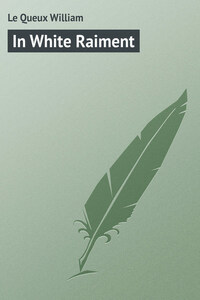Yes; it was utterly inexplicable.
So strange, indeed, were all the circumstances, and so startling the adventures that befell me in my search after truth, that until to-day I have hesitated to relate the narrative, which is as extraordinary as it is unique in the history of any living man.
If it were not for the fact that a certain person actively associated with this curious drama of our latter day civilisation, has recently passed to the land that lies beyond the human ken, my lips would have perforce still remained sealed.
Hitherto, my literary efforts have been confined to the writing of half-illegible prescriptions or an occasioned contribution to one or other of the medical journals; but at the suggestion of the one who is dearest to me on earth, I have now resolved to narrate the whole of the astonishing facts in their due sequence, without seeking to disguise anything, but to lay bare my secret, and to place the whole matter unreservedly before the reader.
Every doctor has a skeleton in his cupboard. I am no exception.
Any dark or mysterious incident, however trivial, in the life of a medical man, is regarded as detrimental by his patients. It is solely because of that I am compelled to conceal one single fact – my true name.
For the rest, reader, I shall be quite straightforward and open in my confession, without the affectation of academic phrases, even though I may be a physician whose consulting-room in Harley Street is invariably full, whose fees are heavy, and whose name figures in the public prints as the medical adviser of certain leaders of society. As Richard Colkirk, M.D., M.R.C.S., M.R.C.P., F.R.S., specialist on nervous disorders, I am compelled to keep up appearances and impress, with a sense of superior attainments, the fashionable world who seek my advice; but as Dick Colkirk, the narrator of this remarkable romance, I can at all times be frank and sometimes confidential.
In the wild whirl of social London there occur daily incidents which, when written down in black and white, appear absolutely incredible. Amid the fevered rush of daily life in this, our giant city of violent contrasts, the city where one is oftentimes so lonely among millions, and where people starve and die in the very midst of reckless extravagance and waste, one sometimes meets with adventures quite as astounding as those related by the pioneers of civilisation – adventures which, if recounted by the professional novelist, must of necessity be accepted with considerable reserve.
Reader, I am about to take you into my confidence. Think for a moment. Have you not read, in your daily paper, true statements of fact far stranger than any ever conceived by the writer of fiction? Have you not sat in a dull, dispiriting London police-court and witnessed that phantasmagoria of comedy, tragedy, and mystery as presented to that long-suffering public servant, the Metropolitan Stipendiary?
If you have, then you will agree that romance is equally distributed over Greater London. Love is as honest and hearts beat as true in Peckham, Paddington, or Plaistow as in that fashionable half-mile area around Hyde-park Corner; life is as full of bitterness and broken idols in Kensington as it is in Kentish Town, Kennington, or the Old Kent Road. The two worlds rub shoulders. All that is most high and noble mingles with all that is basest and most criminal; therefore it is not surprising that the unwary frequently fall into the cunningly-devised traps prepared for them, and even then most prosaic persons meet with queer and exciting adventures.
Chapter One
Mainly about People
My worst enemy – and, alas! I have many – would not accuse me of being of a romantic disposition.
In the profession of medicine any romance, acquired in one’s youth or college days, is quickly knocked out of one by the first term at the hospital. The medical student quickly becomes, in a manner, callous to human suffering, and by the time he obtains his degree he is generally a shrewd and sympathetic observer, but with every spark of romance crushed dead within his heart. Thus, there is no bachelor more confirmed than the celibate doctor.
I had left Guy’s a year. It is not so very long ago, for I am still under forty – young, they say, to have made my mark. True, success has come to me suddenly, and very unworthily, I think, for I confess that my advancement has been more by good luck than by actual worth.
At Guy’s I had been under Lister and other great men whose names will ever remain as medical landmarks, and when I left with my degree I quickly discovered that the doctor’s calling was anything but lucrative.
My first engagement was as assistant to a country practitioner at Woodbridge, in Suffolk; a man who had a large but very poor practice, most of his patients being club ones. Upon the latter I was allowed to exercise my maiden efforts in pills and mixtures, while my principal indulged freely in whisky in his own room over the surgery. He was a hard drinker, who treated his wife as badly as he did his patients, and whose habit it was to enter the cottages of poor people who could not pay him, and seize whatever piece of family china, bric-à-brac, or old oak which he fancied, and forcibly carry it away as payment of the debt owing. By this means he had, in the course of ten years, made quite a presentable collection of curios, although he had more than once very narrowly escaped getting into serious trouble over it.














